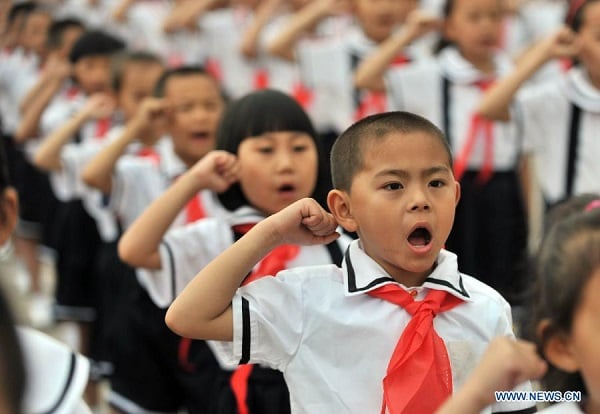
Chinese Communist Youth League “Young Pioneers” (Xinhua)
The smallest, most ordinary scrap of information can often speak volumes about the direction in which a nation is going. A case in point from China is a Fuzhou, Fujian Province public schools memo dated Feb. 29, 2016, on the subject of “moral education” and “education for the Chinese Dream.” This document typifies the current atmosphere in China’s state-run schools and universities and reflects the broader ideological thrust of President Xi Jinping’s “Chinese Dream,” a totalitarian smokescreen for the Chinese Communist Party’s tightening grip on power.
At the top of this year’s list of moral priorities for Fuzhou city schools is “strengthening ideological work,” announced as a national priority last year by Minister of Education and communist culture-warrior Yuan Guiren. A very similar memo dated Mar. 1 appears at Southwest University for Nationalities, and others like these are certain to be circulating at schools and universities throughout China. In line with the broader ideological crackdown under China’s current leadership, Yuan’s announcement last year included a ban on textbooks and teaching content that promote “Western values,” which drew international attention. Yuan reappeared at a March 2016 press conference to “clarify” what he meant by “Western values,” since it had been widely noted that China’s official Marxist ideology is also a Western import.

Chinese education minister Yuan Guiren (People’s Daily)
Education in the People’s Republic of China has always been tightly controlled by the Communist Party of China (CPC), which rules China under a unitary party-state. The CPC directly controls the Ministry of Education and considers education an important means of ideological control. The Fuzhou schools memo and the Southwest University for Nationalities memo both illustrate how directives such as these are passed down to educational administrators and faculty explicitly from local CPC officials. Every public education institution includes resident CPC officials who outrank school administrators, CPC organizations for faculty and staff, and Communist Youth League (CYL) organizations for students. Mandatory CYL activities for students begin as red-scarfed “Young Pioneers” in primary school and continue through secondary school and university.
In addition to CYL activities, students are required to undergo a program of CPC “moral education” or “patriotic education” aimed at instilling “core socialist values” in China’s youth. In “China’s Brainwashed Youth,” Chinese author Qi Ge tells a revealing story of his experiences in China’s patriotic education program. Long on emotion and highly selective on facts, Chinese patriotic education emphasizes China’s victimization and humiliation at the hands of foreign powers, and promotes an attitude of xenophobic nationalism and absolute loyalty to the CPC as the only way of preventing further victimization. “Love the country and love the Party,” students are told, “Without the Party there would be no New China.” Secondary and university students must also participate in People’s Liberation Army military training activities, including about three weeks of mandatory military training before beginning classes at their freshman year of university.
China’s ideological chickens came home to roost in 2012, when angry young products of China’s patriotic education program rioted against the Japanese over the Diaoyu/Senkaku Islands dispute. Acts of violence included beating drivers of Japanese cars and even attacking the U.S. Embassy in Beijing (seen as an ally of Japan). Qi Ge, among others, placed the blame squarely on the CPC’s ideological indoctrination of students.
Under Xi Jinping’s “Chinese Dream” all such efforts at total ideological control and indoctrination are intensifying. The core aims and duties of “ideological work” or “thought work” in schools and universities under President Xi’s and Minister Yuan’s leadership are neatly summed up in the recent memo on “education for the Chinese Dream” in Fuzhou city schools. According to the memo, all responsible parties must “manage the classroom, manage the lessons, manage the internet, manage the community, and strengthen anti-infiltration efforts to prevent harmful ideological and cultural attacks.” For example, in July 2015 a prominent Beijing University professor likewise claimed that youth sexual activity was a “conspiracy of Western culture” deliberately purposed at undermining the morals of Chinese youth.
Because students and young teachers are vulnerable to ideological attacks from these “hostile forces,” Yuan tells us, “Colleges and universities are the forefront of ideological work… In recent years, some countries have seen China’s development and growth as a challenge to their system model and values…further increasing the difficulty of managing university propaganda and ideological positions.” Responsible parties must therefore “keep Marxism front-and-center in the classroom.”
Among others to comment on Yuan’s plan was Zhejiang University party secretary Mei Xinlin, who clearly echoed Yuan’s view of education and educational institutions. According to Mei, universities are “the forefront of ideological work,” so university “leadership must become strong organizers for propaganda and ideological work” and “teachers must become conscious communicators of socialist core values, so that all university students become firm believers in socialism with Chinese characteristics.”
For any teacher or student who might disobey or disagree with Yuan’s directives, state-run Xinhua News Agency has one answer: severe punishment. “We must firmly resist the infiltration of Western ideology,” says Xinhua, and must “crack down on its agents and spokespeople.”
For students and teachers in China’s state-run schools and universities, Xi Jinping’s “Chinese Dream” is quickly turning into a Chinese nightmare.